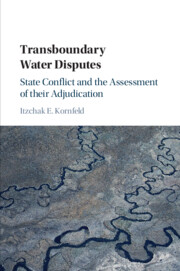Book contents
- Transboundary Water Disputes
- Transboundary Water Disputes
- Copyright page
- Contents
- The Adjudication of Transboundary Disputes
- Table of Authorities
- Other Authorities
- 1 Adjudication and the Scope of Transboundary Water Disputes
- 2 The Proliferation of Dispute Resolution Fora
- 3 The Scope of Transboundary Water Issues and Polycentricity
- 4 Pacific Dispute Resolution & the Limitations on Adjudication
- 5 The Impacts of Sovereignty
- 6 The Courts and Tribunals Assessed Here
- 7 Factors Used in Analyzing Effectiveness
- 8 Analyzing the Disputes – The Supreme Court
- 9 Arbitration of Transboundary Water Disputes
- 10 Conclusion
- Index
1 - Adjudication and the Scope of Transboundary Water Disputes
Published online by Cambridge University Press: 08 February 2019
- Transboundary Water Disputes
- Transboundary Water Disputes
- Copyright page
- Contents
- The Adjudication of Transboundary Disputes
- Table of Authorities
- Other Authorities
- 1 Adjudication and the Scope of Transboundary Water Disputes
- 2 The Proliferation of Dispute Resolution Fora
- 3 The Scope of Transboundary Water Issues and Polycentricity
- 4 Pacific Dispute Resolution & the Limitations on Adjudication
- 5 The Impacts of Sovereignty
- 6 The Courts and Tribunals Assessed Here
- 7 Factors Used in Analyzing Effectiveness
- 8 Analyzing the Disputes – The Supreme Court
- 9 Arbitration of Transboundary Water Disputes
- 10 Conclusion
- Index
Summary
- Type
- Chapter
- Information
- Transboundary Water DisputesState Conflict and the Assessment of their Adjudication, pp. 1 - 11Publisher: Cambridge University PressPrint publication year: 2019



